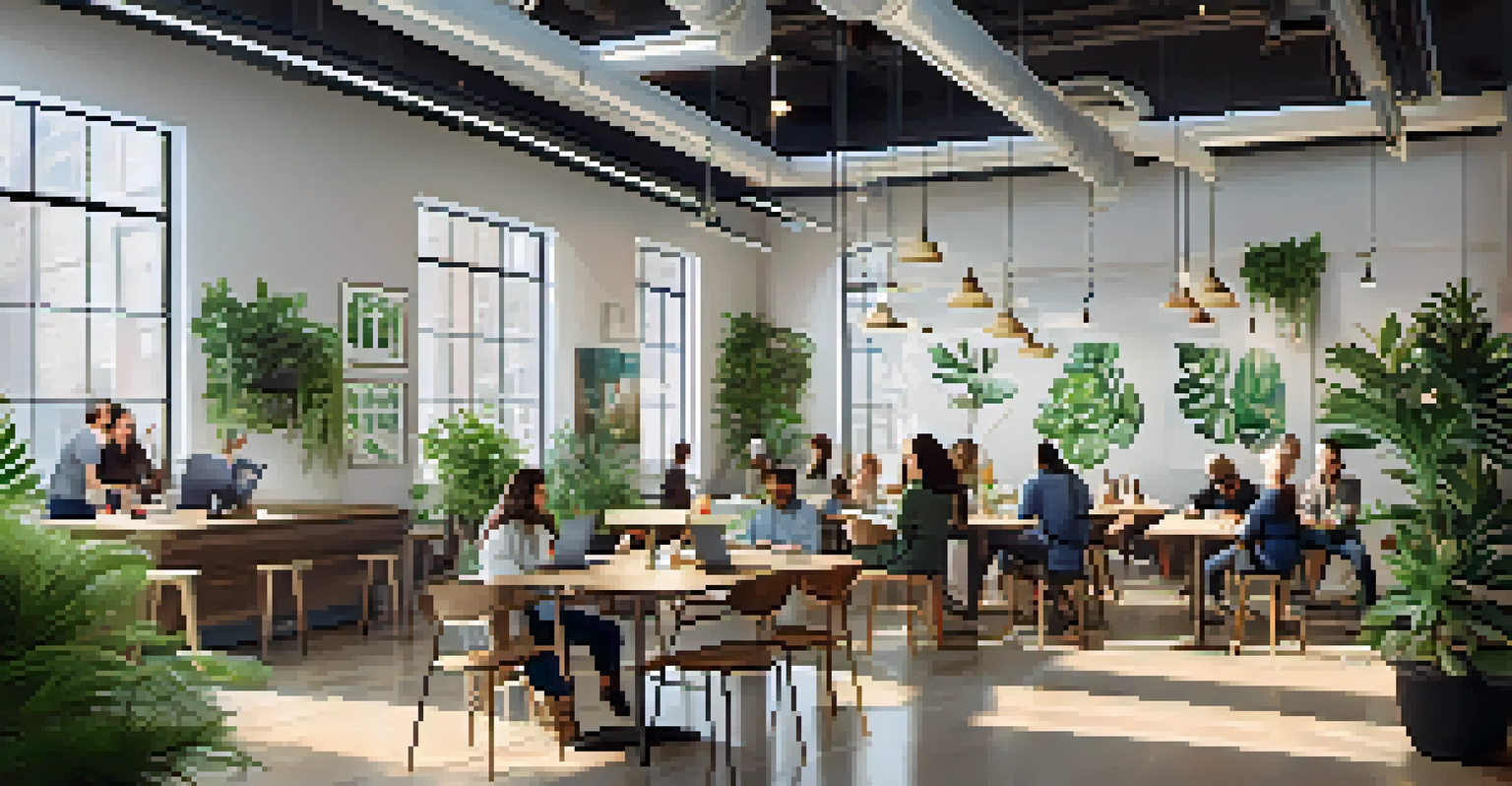Impact of Remote Work on Jersey City's Job Market Dynamics

The Shift to Remote Work: A New Normal in Jersey City
Over the past few years, remote work has transformed from a temporary solution to a permanent fixture in many businesses. Jersey City, with its vibrant economy and diverse industries, has felt this shift acutely. The rise of technology has enabled employees to work from anywhere, leading to a reevaluation of traditional office spaces and work cultures.
The future of work is not about where you work, but how you work.
As companies embrace remote work, they are also reconsidering their talent acquisition strategies. No longer confined to local talent, businesses can now tap into a broader pool of candidates across the nation and even globally. This opens up exciting opportunities for job seekers in Jersey City, as competition increases but so do options.
However, this shift also raises questions about the future of local jobs. Will remote work create a downturn in available positions within the city? Or will it stimulate new sectors as companies adapt to a hybrid model? Understanding these dynamics is crucial for both employers and job seekers alike.
Impact on Local Businesses and Economic Growth
The rise of remote work has had a profound impact on local businesses in Jersey City. Cafes, coworking spaces, and restaurants that catered to office workers are now grappling with reduced foot traffic. Many have had to pivot their business models to accommodate a more flexible workforce, which can be both a challenge and an opportunity.

Moreover, the economic growth of Jersey City faces new dynamics. While the demand for office space may decrease, there’s a burgeoning need for services that cater to remote workers, such as high-speed internet and home office supplies. Local businesses that adapt quickly can thrive by providing innovative solutions tailored to this new workforce.
Remote Work Expands Job Opportunities
Jersey City businesses are now tapping into a broader talent pool, allowing job seekers to explore more options beyond local candidates.
This shift not only impacts individual businesses but also influences the overall economic landscape. The potential for growth in the tech and service sectors could offset declines in traditional roles, leading to a more diversified economy. It’s a balancing act that, if navigated wisely, could position Jersey City as a leader in the remote work revolution.
Changes in Job Roles and Skills Demand
As remote work becomes more prevalent, the demand for specific job roles and skills is evolving. Positions that require strong digital communication and project management skills are increasingly sought after. Employers are now prioritizing candidates who can thrive in a virtual environment, which often means a shift in training and development programs.
Flexibility is the key to a successful work-life balance.
For instance, roles in tech, marketing, and customer service have seen a surge as companies digitize their operations. This trend emphasizes the importance of adaptability and continuous learning among employees. Workers in Jersey City are encouraged to upskill, ensuring they remain competitive in a rapidly changing job market.
Interestingly, this evolution presents a unique opportunity for educational institutions and training programs in the area. By aligning their curricula with the skills that employers are seeking, they can better prepare students and workers for the future job landscape. It’s a win-win situation that fosters both individual growth and economic resilience.
Remote Work and Employee Satisfaction
One of the most talked-about benefits of remote work is the potential for increased employee satisfaction. Many workers in Jersey City appreciate the flexibility to design their work environments and schedules. This autonomy can lead to higher levels of job satisfaction, which is crucial for retention in an increasingly competitive market.
However, remote work is not without its challenges. Feelings of isolation and the blurring of work-life boundaries can impact mental health. Employers must prioritize employee well-being by fostering a supportive remote culture, encouraging regular check-ins, and providing resources for mental health support.
Local Businesses Face New Challenges
The shift to remote work has led to reduced foot traffic for local cafes and coworking spaces, prompting them to adapt their business models.
Ultimately, companies that recognize and address the nuances of remote work will reap the benefits of a happier, more engaged workforce. Employee satisfaction can lead to increased productivity and innovation, which are essential for navigating the complexities of today's job market.
The Role of Hybrid Work Models in Jersey City
Hybrid work models, which combine remote and in-office work, are gaining traction in Jersey City. This approach allows companies to enjoy the best of both worlds, providing flexibility while maintaining some level of team cohesion. As businesses experiment with hybrid structures, they are discovering new ways to enhance collaboration and productivity.
For employees, hybrid models offer a refreshing compromise, allowing them to enjoy the benefits of remote work while still having opportunities for face-to-face interaction. This flexibility can help maintain a strong company culture, which is vital for long-term success. It empowers staff to choose what works best for them, leading to a more motivated workforce.
However, implementing a successful hybrid model requires thoughtful planning and communication. Companies must establish clear expectations and guidelines to ensure all employees feel included, whether they're working remotely or in the office. The right balance can lead to a thriving work environment that attracts top talent to Jersey City.
Challenges for Job Seekers in a Remote Work Landscape
While remote work offers numerous opportunities, it also poses unique challenges for job seekers in Jersey City. The expanded job market means increased competition, as candidates from various locations can now apply for the same positions. This can make it more difficult for local job seekers to stand out.
Additionally, the remote hiring process itself can be daunting. Candidates must be adept at showcasing their skills through virtual interviews and assessments, often without the benefit of personal interactions. Building a strong online presence and honing digital communication skills are becoming essential for those looking to succeed in this new job landscape.
Hybrid Models Enhance Work Flexibility
Hybrid work models are gaining popularity in Jersey City, offering employees a balance between remote flexibility and in-office collaboration.
However, these challenges also encourage job seekers to be more resourceful and innovative in their approach. Networking through online platforms, participating in virtual job fairs, and engaging in continuous learning can help them navigate the competitive landscape effectively. Embracing these strategies can ultimately lead to fruitful employment opportunities.
Looking Ahead: The Future of Work in Jersey City
As we look to the future, the landscape of work in Jersey City is poised for ongoing transformation. Remote and hybrid work models are likely to remain integral to how businesses operate, shaping job roles and expectations in the process. The adaptability of both employers and employees will be key in navigating these changes successfully.
Furthermore, the city’s focus on technology and innovation positions it well to become a hub for remote work initiatives. By fostering a culture of flexibility and inclusivity, Jersey City can attract diverse talent and bolster its economic growth. This evolution could lead to a dynamic job market that reflects the needs and aspirations of a modern workforce.

Ultimately, the impact of remote work on Jersey City's job market dynamics is a multifaceted issue that requires ongoing dialogue and adaptation. By embracing change and prioritizing collaboration, both businesses and workers can thrive in this exciting new era of work.